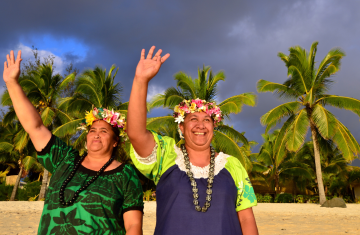
Honiara, Solomon Islands, 28 November 2022: The ISLANDS Pacific Project has offered its congratulations to the Solomon Islands’ government for its recent accession to the Basel Convention. This has far-reaching benefits for the nation, many of which will directly involve the ISLANDS Pacific Project.
ISLANDS Pacific is part of a global initiative that addresses hazardous chemicals and waste management funded by the Global Environment Facility (GEF), led by the UN Environment Programme (UNEP) and executed regionally by The Secretariat of the Pacific Regional Environment Programme (SPREP).
Ms. Debra Kereseka, Deputy Director Environment explained what the Basel Convention means, “our country is at the crossroad with the advent of a highly globalized world, free trade and the flow of materials (including wastes) across international borders. The country’s precarious situation is compounded by our fragile ecosystems with limited national capacity and resources to properly manage environmental pollutants including hazardous wastes, radioactive materials and other chemicals.” She continued, “the guidance and support to safeguard us against unruly international waste management practices that are tied to illicit trade are provided by this (Basel) Convention.”
As a party to the Basel Convention the Solomon Islands will now be able to access additional resources made available from the ISLANDS Pacific Project. This will greatly assist in advancing the nation’s efforts to sustainably manage hazardous chemicals and waste.
Ms. Kereseka added, “the Solomon Islands’ ability to work through the ISLANDS Pacific Project will be enhanced through our recent accession to the Basel Convention because it governs the trade in wastes rather than prohibits such trade; it ensures that transboundary movements of wastes are reduced to a minimum, and it also ensures transfer of wastes are consistent with environmentally sound and efficient management.”
This new status supports the export of scrap metals and opens up options for accessing markets outside of the Pacific region such as South Korea and other Asian nations for especially potentially hazardous items like Used Lead-Acid Batteries (ULAB). Similarly, it supports the development of an e-waste management system which includes recycling and recovery of precious metals from redundant technology.
It is also important to note that this development will help enhance the Solomon Islands’ presentation to the region and the world as it ramps up for next year’s South Pacific Games. Ms. Kereseka noted, “as we work towards a cleaner Solomon Islands for the Pacific Games in 2023, our inclusion in the Basel Convention is timely to enable recycling companies and other private sector entities interested in recycling to access better markets overseas for recyclable waste.”
About ISLANDS
The Implementing Sustainable Low and Non-Chemical Development in Small Island Developing States (ISLANDS) Programme is a $515-million, five-year initiative backed by the Global Environment Facility (providing $61 million), supporting 33 Small Island Developing States in four regions - the Atlantic, Caribbean, Indian and Pacific Ocean to reduce and manage toxic waste in their territories. ISLANDS is led by the United Nations Environment Programme, in cooperation with the United Nations Development Programme, Food and Agriculture Organization of the United Nations, and the Inter-American Development Bank.
About the UN Environment Programme
The UN Environment Programme is the leading global voice on the environment. It provides leadership and encourages partnership in caring for the environment by inspiring, informing and enabling nations and peoples to improve their quality of life without compromising that of future generations.
About the Global Environment Facility
The Global Environment Facility is the largest multilateral fund working to enable developing countries to invest in nature. It supports the implementation of international environmental conventions on biodiversity, climate change, chemicals, and desertification. Since 1991, it has provided more than $21.7 billion in grants and blended finance and mobilized an additional $119 billion in co-financing for more than 5,000 projects and programmes.
For more information, please contact: Ms. Renee Kamu, ISLANDS Finance & Administration Officer on [email protected]
